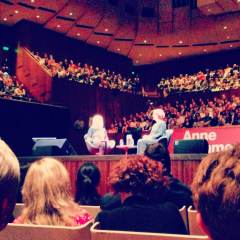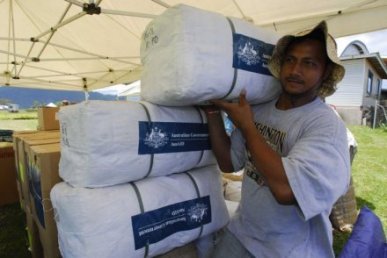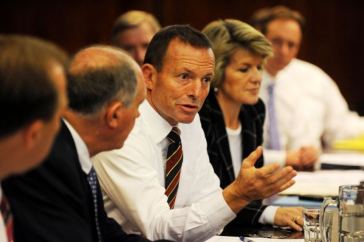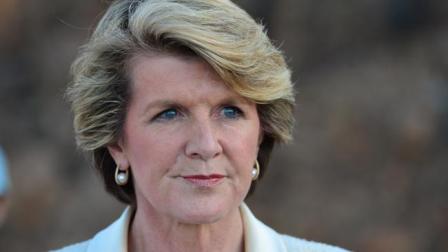Now, I know that the main premise of this blog is to examine the Abbott Government one glass of wine at a time, but even I am particularly intrigued about recent developments within the ALP. The most notable has been the decision by The All Knowing and Omnipotent God, I mean, Kevin Rudd, to allow the members a say in who will be the next ALP leader. It’s a format that also works particularly well for Australia’s Got Talent. Essentially, 50% of the caucus gets a say, with the remaining 50% going to a vote with the members. If there is still no leader, Bill Shorten’s head explodes and the universe as we know it ceases to exist.
Fairly easy to understand methinks. If you’re lost, you probably should refer to the ALP rule book, because let’s face it, no one really knows what’s going on.
The two players in this Shakespearean tragedy are Anthony Albanese – or Albo to his mates, and Bill Shorten – or just Bill Shorten to everyone else. The apex of the drama unraveled on Tuesday night at the ALP leadership debate held at the University of Technology. The debate allowed questions from the floor and gave the members a unique insight into the policy differences between Albo and Shorten. After an hour later, it turns out the policy differences are fairly minor. It also turns out one shouldn’t watch too much politics on a romantic holiday away with the missus, or else someone gets a little cranky.
Anyway, this is a long post, so get comfortable …
The Opening Address
Bill Shorten kicked off the debate with a stirring opening address. He commenced by discussing the impressive (his words, not mine) history of the ALP. As leader, he wants to make the ALP relevant to Australians by making sure it’s a party that stands up to improving the quality of life for its citizens. The party needs to bring in fresh blood, rather than rely on the true believers to turn around the fate of the party. Shorten also ripped off – I mean, drew on the material of former PM Whitlam, who emphasizes the importance of the three Ps – Party first, Policies second and then the People. Essentially this means that the party needs time to reconstruct, formulate a vision for Australia and eventually this will be communicated to the broader community. Shorten believes that in order to win the next election, they must be an effective opposition in parliament. However, unlike a certain opposition leader they weren’t keen on, the ALP must stay positive about their vision of society and be the party of ideas.
Shorten’s address seemed to learn from the ALP’s previous experiences in opposition after the 1996 election. During that time, it seemed that Beazley, Latham and even Rudd to an extent wanted to distance themselves away from what I consider to be a proud period of reform under Hawke and Keating. His speech was focused remembering the Rudd / Gillard / Rudd legacy and reflecting on their impressive contribution to Australia. (NB: backstabbing not included).
His opening address concluded with something of a PSA – that the ALP needed to be the collective voice of the vulnerable and the voiceless, which is undoubtedly a powerful sentiment in light of Abbott’s proposed cuts and suspiciously all male cabinet.
Albanese’s opening address revisited many of the themes touched on by Shorten. There was so much emotional and respectful touching going on. I was expecting the two of them to burst out into an open bro hug, saying to one another “No, you be leader Shorten”, “No Anthony, you would be a great leader”. Albo was impressed with the revamped energy within the ALP, saying that he couldn’t believe that this was the state of the party after loosing the election. I think that has a lot to do with seeing a whole lot less of Kevin Rudd, who has a remarkable ability to sap the life source out of anyone really. Albo’s view of the ALP is that it’s a party that needs to be united and focus on becoming a better and fairer country in the future. Typical lefty stuff really. He also discussed the four pillars, but as I loathe anything related to numerical points or support beams, I will refer you to his website instead. (http://www.alboforleader.com)
First Question from the Floor: What type of PM would you be?
Albanese had a classic two pronged approach to this question. First, he decided to blatantly attack Abbott’s self appointed title as the Infrastructure minister.
According to Albo, the affectionately known Infrastructure Prime Minister has made significant cuts to the NBN, roads and public transport. In response, Albanese intends to wrestle for the title of Infrastructure Prime Minister, provided he has the required fitness to catch Abbott during a triathlon. Albanese stated that he would invest in public transport, roads and the NBN to create the economy for the future.
Now, I appreciate the fact that these politicians are in the business of visions and big ideas, however even I had a niggling thought about how these big projects will be funded. But let’s not concern ourselves with the minor details, right?
The second tier to Albanese’s answer was that he didn’t really answer the question at all. On the onset, it was an attack response against the PM. This was spectacularly inefficient considering you’re already preaching to the converted. If you’re going to find a room filled with people who didn’t like Abbott, it would most likely be an ALP convention trying to work out who would be the most tenancious opposition leader. But I digress. I personally was disappointed he didn’t do a strong job at articulating his vision for the type of PM he wanted to be. But again, to be fair, Albo never anticipated to be leader of the ALP or Prime Minister for that matter. I do however hope that this is something he considers further in the future and will be able to better articulate the type of leader he wishes to become.
Shorten took a markedly different approach to Albo – he wants to be the Prime Minister for the Powerless and the Disenfranchised. I wonder if the faceless men in the ALP satisfy that particular definition? Potentially. Shorten also took an unexpected turn, saying that he wanted to give a voice to those who had suffered from domestic violence who are unquestionably one of the most powerless and disenfranchised in the community.
Overall, I though that Shorten was much more polished and eloquent than Albo in respect to this answer. I do wish to note however that Shorten’s political apsirations are one of Canberra’s worst kept secrets. That said, I felt that Shorten had a much more cogent response to the question which was well articulated. The audience seemed less than impressed and a great deal more cynical to Shorten’s vision and expressed greater warmth toward Albo.
Second Question from the Floor: What is your strategy for engaging with young people?
As someone who is a fairly hip and happening “young person” on the instabook and twatter, this question was particularly relevant to me. Both Shorten and Albo recognized that the interwebs were central to being relevant with the kids. If this means more selfies a la Rudd style, I politely decline all involvement with the ALP. Thankfully, both candidates seem fairly adept at using technology. Albo in particular has that whole “You used to be kinda cool and I was pretty impressed with your song choices on Rage” type vibe going for him. It’s almost like he’s the anti hipster in an electorate full of hipsters – he was cool before people knew what was meant to be cool.
Shorten and Albo touched on issues that were of particular relevance to young people such as education, the NBN, internet censorship and climate change. I was impressed with Shorten introducing the idea of further ALP reforms to make the party more accessible to young people, which is something I strongly support. I still vividly remember my first day at O-Week at the University of Sydney. My friends and I tentatively approached the Young Labor stand, expressing interest in joining. I was put off a week later after realizing that most people who were involved in uni politics were what I would call tossers. Considering that the ALP are a large part of the reason why I am here today, it was a bit heart breaking for an 18 year old ideologue. But then upon further reflection, I realized that this sounded remarkably similar to what Albo had been advocating for not mere minutes, in Shorten’s case, but years. (Albo4Leader:2013)
If Shorten or Albo can do anything to make the ALP more relevant to young Australia and get rid of the wanker element, they’re onto a good thing. Maybe they should have a chat to that Whitlam chap my dad keeps going on about. He had a few ideas about the youth of Australia and It’s Time we paid attention and re-engage with the kids.
Question Three from the Floor: The Refugee and Immigration Issue
I wish to offer a personal disclaimer at this point in time – I wasn’t able to hear the responses to this question as a certain girlfriend took a call from a certain best friend and proceeded to interrupt my viewing pleasure of the ALP leadership debate. Let’s just say that the responses from Albo and Shorten were fairly similar – again, they rehashed the notion that Refugees needed to be treated with humanity and that the ALP have traditionally been the great parties for immigration. However, again they emphasized that it was perfectly acceptable to have a controlled migration policy
I personally hope they address the UK backpacker situation. It would be nice to be safe in the knowledge that I don’t have to walk through Coogee and Bondi being drunkenly cat called by those who have overstayed their tourist / 457 visas.
That’s right, I went there.
Both Albo and Shorten did do their best to appeal to the lefties of the ALP and the not so lefty members. They also may have attempted to bring back some of those who had shifted to the Greens while still holding onto their base. I’ll be interested to see what happens to the Greens as the issue of asylum seekers is a “unique selling point”. (See what I did there, Gruen Transfer? You’re not the only one who can use marketing lingo at inappropriate moments.) On the issue of asylum seekers, it was just a classic case of sitting on the fence, hoping to appease someone. The ALP aren’t quite as inhumane as the LNP when it comes to people lawfully seeking asylum, but there is this underlying prejudice and xenophobia that needs to be appealed to. So what you have is a policy that doesn’t stand for anything or really do anything aside from perpetuate an unfounded fear of “boat people”.
Hopefully, both the candiates can flesh out a more nuanced response to this issue. Or if they did and my girlfriend spoke over the top of their responses, please let me know.
Question Four and Five from the Floor– Aged Care and the NDIS
The following questions from the audience relate to the ALP positions on Aged Care and the NDIS. Again, both Shorten and Albo’s responses fell into line with the ALP’s ideology, however there were two things I wanted to discuss.
The first relates to Albo suggesting that we need to set up a Sovereign Wealth fund to bolster the savings of the next generation of retirees. This may link back into my question of how he proposed to be the next Infrasructure PM. If this is indeed the case, we may be onto something of a winner here – if the Sovereign Fund was used to fund infrastructure at a reasonable return on investment – eg 5%, you’ve simultaneously solved two problems namely the lack of capital and old people.
Again, Shorten was remarkably impassioned during the question on the NDIS which he attributed to such landmark reforms such as Medicare, Superannuation and the fair working wage, all of these being pillars of ALP policies. The ALP, according to Shorten, are at its best when it’s able to communicate to the community. Bloody obvious thing to say there Shorten, isn’t politics just an intellectualized form of Public relations? Forget it- let’s skip the intellectualized portion of that sentence- just PR? If the past 6 years has taught me anything, it’s that the ALP need a serious image overall and a few classes in effective communication because they delivered substantial reform in a hostile parliament and Australians still hate them.
Albo opened up to this question with a touching story about his mother, who had severe arthristis. This related to the NDIS -sometimes you simply don’t know who to ask for help and people should always be able to ask for help. The ALP should stand for the most vulnerable in society, and it’s a sentiment I strongly agree with. Consider the ALP for example – we have Albo, who grew up in Housing in Sydney’s South West with a single mother and now he’s vying to being leader of the opposition. We have Kevin Rudd, who spent parts of his childhood living in his mother’s car, to Gillard who came from proud Welsh immigrant parents. Even Keating, the uneducated boy from Bankstown became one of Australia’s greatest poltical visionaries and economic managers. Going back even further, Whitlam was the darling of Cabramatta and Chifley was the working class man who dared to dream.
The ALP have a proud tradition of representing the voiceless or the often ignored in Australian politics. However, times have changed. Some guy by the name of Howard became PM in 1996 and immeasurably changed the socio-economic and cultural climate of the country. People don’t want to view themselves as the under-privileged – there is no nobility in being poor in Australia. They want to be a part of something, they want to be included into broader Australia and be aspirational. That was the allure for much of middle Australians, who would be later known as “Howard’s battlers”. Middle Australia ceased being battlers or the “disadvantaged”, they wanted a piece of the economic pie – and if they couldn’t score a piece, they at least wanted to taste some of the crumbs.
Both leaders would do well to re-articulate their view of the ALP being the party for the vulnerable. Humans are strangely aspirational creatures – they want something more for themselves, their family and their sprogs – I mean, kids. The emphasis should be a better Australia for all Australians, which is inclusive and truly representative. Hopefully they will work it out for themselves instead of listening to a lone blogger.
Question Five from the Floor – What is the role for Women in Leadership?
Albo reflected on the ALP’s history when it comes to promoting women to position of leadership. Women, he argued have a critical role to play and rattled off an impressive list of women including Gillard, Wong, Plibersek and Nash. Women will continue to have an important role to play within the ALP – because let’s face it, there are more women in the ALP caucus then there are in the LNP. Plus, the LNP aren’t exactly on the hunt for female talent at the moment, with one in cabinet and one parliamentary secretary. One of the success stories of the ALP is that 40% of women are now on Government boards, and Albo believes that they have contributed immeasurably to those organisations.
Shorten discussed the ongoing systemic discrimination that persists in Australian society. Big words there, smart guy. He argued that the ALP needed to be vigilent to ensure that the Abbott Government doesn’t turn back the clock on equal wages, just in case they get wages and boats muddled up. Shorten also returned to the subject of domestic violence and was actually getting quite riled up about the topic. I’m not sure why domestic violence is the central point of distinction with Shorten and Albo, but I kind of like the fact he’s passionate about something, other than being the ALP kingmaker. Shorten concluded that if he were to become leader of the opposition, he would make Plibersek deputy, which is something that Albo is unable to do. Two Sydney inner west lefties don’t make a right, but they do make a delicious soy latte. It’s a smart move by Shorten and may have some affect of drawing in a few more female supporters.
Either way, I for one am happy that the ALP will continue to stand for women in parliament and within the party. However, they kind of have to in this situation, in light of the LNP’s lackluster way they’re promoting “female representation” in parliament. Still, it’s a good step for the party that brought us our first Female Prime Minister and our first lesbian, Malaysian Senator.
Concluding Remarks
In conclusion, Albo surmised his debate to argue that it is only the ALP government that tackles the big problems. He wanted the ALP to use this time to defend their legacy over the past six years. They needed to be a strong opposition, but not so negative to draw on the strategic inferences of the “no-alition”.
(On a side note, any time Albo makes a funny he does this little smirk and it’s kind of cute … Oh god, what is wrong with me?)
Albo also stressed that they needed to continue to be committed to making a different to ordinary people. Australians want their kids to inherit better living standards and better opportunities than what was afforded to them. In addition, all of the ALPs policies and approaches need to be sustainable and therefore they need to defend a price on carbon. He wound up his speech by saying that he never envisioned he would be leader. At first, all he wanted was to make a contribution to the team and to his electorate. But after further contemplation, he felt he had a role to play. He has the vision, the unity required, the experience and strength to be leader.
Shorten however wants the ALP to reposition itself to make sure it continues to be relevant to Australians. As opposition leader, he will ensure that Abbott will not set the discourse. Again, he returned to his Whitlam quote – that it’s about the party, the policy and then the people. For the ALP, the period of the messiah is over – they need to be a party that is brave, which is focused on the future and delivering for the powerless. I nearly self combusted with pure joy when Shorten said that it is less than “I and more about We”. I wondered whether Rudd could feel the subtle burn of that remark. Perhaps he was too busy taking a selfie to notice.
Personal thoughts on the debate
For me, the winner in this debate was Albanese, but not by much to be completely honest. Albanese will need more time to construct policies and clearly articulate his view of what he wants Australia to become. In this debate, he seemed on the offensive, but not against his running mate, but rather against the LNP government. He had some fantastic zingers though – my personal favourite was where Albo declared that climate change was a non-issue now that Abbott is in power. He also brought forward quality material critiquing the “noalition” and their failure to do anything other than deliver cuts and hiding the boats.
I felt that was slightly off topic for the debate – his role was to articulate what makes him different from Shorten and what makes him a capable leader. But as I’ve mentioned before, it’s because he’s never had slow burning ambitions to become the leader of the ALP. Albo is a committed team player, and he’s what the party needs – a leader to heal the wounds of the past few years. I will say this- he was genuine and I felt like I could trust him. Albo has remained steadfast in his political views and aspirations. He is not interested in becoming leader for personal gain, but rather for the betterment of the party. His story is the embodiment of the ALP narrative – the kid who grew up in housing commission, caring for his single mother who went onto to university and dedicated his life to serving his party, his electorate and Australia.
Call me an idealist, but I think those are fine qualities in any leader. He is the Every Man. Let’s face it, he’s appealing to the youth, the left faction and the disenfranchised – in other words, what should be the ALP’s base. He has a broad appeal and the Roy Morgan poll has found that he has strong support with rank and file (Roy Morgan). Hell, even members of the Right caucus such as Swan and Emerson have hinted support (SMH:2013)
Some guy called Latham, who is better known as the former ALP leader and all round noise maker has vocally dismissed Albo as an intellectual lightweight with no substantial policies and poor political intuition ( AFR : 2013). I disagree with Latham’s assessment and not just because of the 2004 election which featured him as leader. Not only he is probably being a bit of a sook that people actually like Albo, but thr attributes he is critical of are things which can develop over time. To quote Shorten, first the party, then the policies and then the people. In Albo’s case, two out of three isn’t bad so early in the game.
It must be said however that I was impressed with Shorten’s performance and ability to articulate his vision for Australia. He has also been a policy powerhouse and he has been instrumental at getting Disability Care through the parliament. Shorten, throughout his speech quoted Whitlam’s three p’s. Shorten employed his own three Ps – he was polished, professional and persuasive. Even though Shorten’s performance was much stronger than Albo’s, I still feel unsettled by what he said. His involvement in the leadership spills and ongoing instability within the party means his candidacy is tainted and would give the Abbott Government renewed fodder to draw on.
The general public haven’t warmed to Shorten in the way the Caucus has. I suspect, like an article from the Australian stated, it’s because his words don’t correlate to his actions. His talk about improving the visibility of women in leadership roles within the ALP doesn’t reflect his prior actions. (The Australian: 2013) There have also been allegations that Shorten set up one of the debate questions relating to the type of PM he hopes to become.( The Guardian: 2013) I suspect that those who have followed the ALP will take Shorten’s words with a pinch of salt. Shorten’s ambition for leadership is also off-putting, there have been allegations that he expects to secure the caucus. ( The Australian: 2013 )
There have been two wins out of this debate though. The first is improved membership involvement – even I am noticing more people are being compelled to join the ALP. Should Albanese become leader, it is expected that further reforms will take place to improve membership participation, and unlike Shorten, this is a position he has held for years. But it was also a win for mutual respect – both have pledged to support whoever is to become leader, and if those words ring true, it will be a good day for the ALP.







